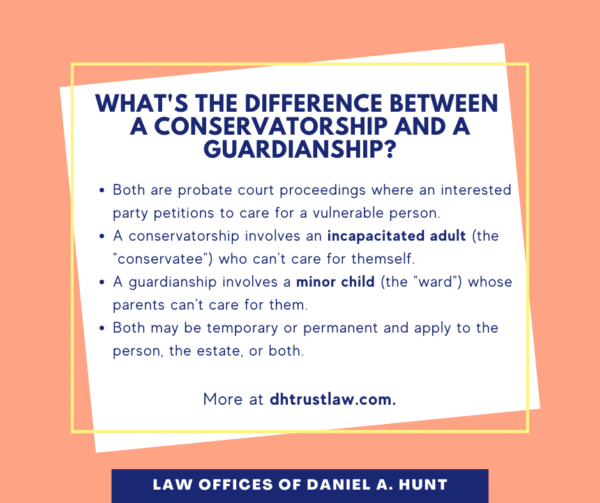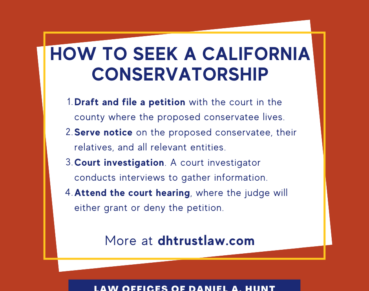What’s the Difference Between a Conservatorship and a Guardianship?

Many people have called our firm asking about a guardianship for an incapacitated loved one when they are really seeking a conservatorship. What is the difference between a conservatorship and a guardianship in California? While conservatorships and guardianships are both legal arrangements that involve someone taking care of another person’s affairs, there are key differences between them.
Purpose of a Conservatorship Versus Guardianship
A conservatorship is a probate court proceeding in which a person is given legal authority over the personal and/or financial affairs of an incapacitated adult (the “conservatee”). The conservatee is typically unable to care for themselves due to some degree of incapacity, such as a mental illness, disability, or advanced age.
A guardianship, on the other hand, is a probate court proceeding whereby a person is given legal authority over a minor person under the age of eighteen (the “ward”). Some guardianships are necessary after a tragic event, such as a deadly accident. More often, they’re required when parents are not fit or able to care for their child, because they’re incarcerated or addicted to drugs or alcohol.
The purpose of both of these arrangements is to care for a vulnerable person, but conservatorships apply to adults while guardianships apply to minors.
Types of Conservatorships and Guardianships
Both conservatorships and guardianships are designated as of the person, of the estate, or both. A conservatorship or guardianship of the person focuses on making decisions about day-to-day life, such as:
- Where the person will live and/or go to school
- How their personal needs are met, such as meals, clothing, bathing, etc.
- Medical decisions like where they’ll receive medical care and what types of medical treatments they’ll receive
On the other hand, a conservatorship or guardianship of the estate focuses on making financial decisions, such as:
- Paying bills
- Making or managing investments
- Collecting income or assets on behalf of the person
A person responsible for both the person and the estate would handle both personal care and financial matters.
How To Seek a Conservatorship or Guardianship
The legal process for seeking a conservatorship or guardianship is quite similar. It starts with an interested party filing a petition with the court and providing evidence of the individual’s incapacity or a minor’s need for care. The court reviews the evidence, holds a hearing, and if the petition is granted, appoints a conservator or guardian.
Who Serves as Conservator or Guardian?
Who is typically appointed as a conservator or guardian? Any interested party may file a petition for a conservatorship or a guardianship. Often this person is a family member or close friend.
What happens if the parents named a guardian for their minor child in an estate planning document like a will or trust? Even in this scenario, the nominee does not automatically become the guardian upon the parents’ death or incapacity. The potential guardian must still petition the court to fill this role and their authority does not begin until the court appoints them as guardian.
How Long Do They Last?
How long do these arrangements last? A conservatorship can be temporary or permanent, depending on the circumstances. If a conservatorship is permanent, there will still be periodic court supervision to ensure the arrangement is in the best interest of the conservatee.
A judge may grant a temporary conservatorship when a conservatee has immediate needs that can’t wait months for a general conservatorship to be granted, or when there’s a gap after one conservator is removed and a new one hasn’t yet been appointed.
Similarly, a guardianship can also be temporary or last until the minor child turns eighteen. Long-term guardianships may be arranged in scenarios like when both parents are deceased. A temporary guardian may be appointed when parents will be out of the country for an extended period of time when they’re incarcerated, or if they’re expected to recover capacity in the future (for example, after going to rehab).
Terminating a Conservatorship or Guardianship
When do conservatorships and guardianships terminate? A conservatorship may be terminated by the court if the conservatee:
- Passes away
- Regains capacity (for example, comes out of a coma)
- Or if the court determines that the conservatorship is no longer necessary, as in the case of Britney Spears.
A guardianship may be terminated if the ward:
- Passes away
- Turns eighteen and becomes a legal adult who can manage their own affairs
- Or if the court finds that the guardianship is no longer required; for example, if a parent attains sobriety and can resume a parental role.
If you’d like to seek a conservatorship, seek the counsel of an experienced conservatorship attorney to guide you through this process. If you want to serve as a legal guardian for a minor, seek the advice of an experienced guardianship lawyer. If have any questions about this topic, feel free to contact our law firm.
Law Offices of Daniel A. Hunt
The Law Offices of Daniel A. Hunt is a California law firm specializing in Estate Planning; Trust Administration & Litigation; Probate; and Conservatorships. We've helped over 10,000 clients find peace of mind. We serve clients throughout the greater Sacramento region and the state of California.




